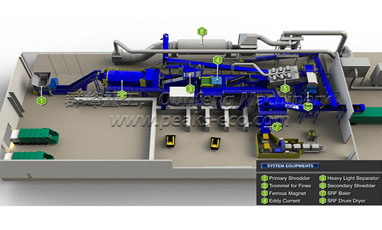The collection of solid waste is a fairly complex issue. Garbage sorting equipment supplier believes that solid waste can be divided into two types according to the collection method. One type is waste that can be recycled at the waste collection point, such as old newspapers, non-ferrous metals, waste steel, rubber, plastic, etc. Collected by the waste material recycling system belonging to the commercial sector, the other type, such as factory waste residue, dust, daily life garbage and so on. Because this kind of waste has relatively low utilization value, it is particularly easy to be ignored and discarded arbitrarily, which causes greater harm to the environment. There is a large-scale application of solid waste treatment or comprehensive utilization, and the amount is too small. Decentralized treatment or utilization is often not economically feasible and technically difficult. Therefore, it is necessary to collect a small amount of waste scattered in various factories or sources. Transport to the appropriate disposal site.
Municipal solid waste has many types, complex components, and different properties, so its classification methods are also many. According to its physical properties, it is divided into organic waste and inorganic waste; according to its form, it is divided into solid waste and slurry waste; Its hazardous status is divided into toxic and hazardous waste. Waste and general waste; by industry, there are mining waste, metallurgical waste, chemical waste, civil waste, etc .; according to the requirements of different treatment methods, it can be divided into combustible waste and non-combustible waste, compostable waste and non-compostable waste, and Resource-based waste and difficult-to-resource waste, etc. According to the source, the mouth is divided into industrial solid waste, agricultural solid waste, mining solid waste, urban domestic waste, radioactive solid waste, and many countries in Europe and the United States are classified according to this principle. Japan divides solid waste into industrial solids.
Both physical waste and general solid waste. Starting from the management of solid waste in China, it is usually divided into three categories: industrial solid waste, hazardous solid waste and general solid waste (referring to urban solid waste and agricultural solid waste)

Garbage Sorting System Factory
The collection of domestic garbage can be divided into three stages.
The first stage is the process in which garbage is generated from households to trash cans. There are many ways to generate and collect garbage at this stage. Whether it is classified collection or mixed collection, fixed-point collection, regular collection, or on-site collection. The collection of domestic garbage in China in 2001 was still based on fixed points and regular timing. Therefore, residents from the households to the bins are responsible for the garbage;
The second stage is the process of garbage collection from garbage collection trucks to various garbage collection points. This process is related to the collection method of garbage collection trucks. The garbage collection trucks use the container exchange type to transport empty garbage bins and put them in the garbage. At the collection point, the actual trash can is transported back to the treatment and disposal site or the transfer station, and after it is discharged, it is sent to the next collection point. The fixed container collection system is still used (the garbage truck loads the garbage in the garbage bin at the collection point into the garbage collection year, and the garbage bin is still put back in place).
The third stage of garbage collection and transportation is to transport the garbage collected in each collection area to a transfer station or various types of garbage processing and disposal sites. If a city has a garbage sorting system factory, determine the number of garbage collection sites to which each collection area should be sent and the amount of waste to be transported. Disposal fees> the most economical.